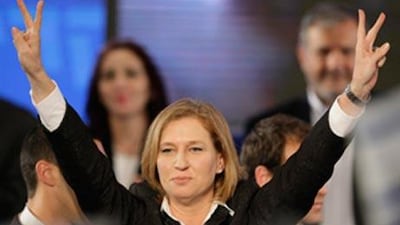Israel faced today what could be weeks of political uncertainty after an election that ended with clashing claims of victory by centrist foreign minister Tzipi Livni and hawkish rival Benjamin Netanyahu. "I won," read the front-page headline of Israel's biggest newspaper, Yedioth Ahronoth, next to photos of Ms Livni and Mr Netanyahu. Nearly final results gave Ms Livni's Kadima party 28 seats to 27 for Mr Netanyahu's right-wing Likud in the 120-member parliament. She said she would become prime minister and invited him to join a "unity government".
Mr Netanyahu, pointing to what he called a large "nationalist camp" in parliament, said he would head a coalition government, comprised of rightist parties. "I will lead the next government," Mr Netanyahu, 59, told Likud supporters after exit polls yesterday gave Kadima a slim lead and right-wing parties 64 seats, enough for a parliamentary majority. Addressing cheering Kadima activists, Ms Livni, 50, said: "The Israeli public can smile again when we form the government." She would become Israel's first woman prime minister since Golda Meir governed in the 1970s.
It will be up to the president, Shimon Peres, to decide, after hearing recommendations from political parties, whether to ask Ms Livni, a relative newcomer to politics, or Mr Netanyahu, a former prime minister, to try to put together an administration. The overall rightward shift in the Knesset will, in any case, dent hopes in the US president Barack Obama's administration for an Israeli coalition that can move towards peace with the Palestinians and other Arab neighbours after last month's war in the Gaza Strip.
"Tzipi Livni has only the slightest chance, or none at all, of forming a government under her leadership," Abraham Diskin, a political scientist at Jerusalem's Hebrew University, told Israel Radio. "The bottom line is that there's a good chance that a Likud-led government, with Kadima's participation, will be established," he said. Mr Peres's discussions with Knesset factions could take about a week and subsequent coalition negotiations could drag on for more than a month.
Avigdor Lieberman, whose far-right Yisrael Beiteinu party, surged into third place on its anti-Arab rhetoric, emerged as a potential kingmaker. He said he was leaving his options open, indicating he could choose to join a Likud or a Kadima-led government. Ehud Olmert of Kadima, who resigned in September in a corruption scandal but stayed on as caretaker prime minister, will remain in the post until a government is in place.
Mr Olmert will oversee processes such as the consolidation of a truce that ended the recent Gaza war against Hamas militants and preparations for any showdown over Iran's nuclear programme. Whoever Mr Peres chooses will have up to 42 days to try to put together a government. Israel's president traditionally picks the leader of the party that wins the most votes, but he is not legally bound to do so.
The defence minister Ehud Barak's long-dominant, centre-left Labour party was cut down to fourth place behind Kadima, Likud and Yisrael Beiteinu, an upstart ultranationalist party catering mainly to immigrants from the former Soviet Union. Mr Netanyahu was cruising to victory until Mr Olmert's centre-left coalition launched a three-week offensive in Gaza. It won massive popular support in Israel despite international outcry over the 1,300 Palestinians killed in the Hamas-ruled enclave.
Some political analysts said Mr Netanyahu had been too complacent, enabling Kadima to catch up and Ms Livni, a former Mossad spy and corporate lawyer, to gain in popularity. Ms Livni led peace talks with the Palestinians on a two-state solution, which stalled last year but which Mr Obama wants to resume. Mr Netanyahu is cooler on ceding occupied territory to Palestinians and is more likely to resist US demands to curb settlement expansion in the West Bank.
*Reuters

